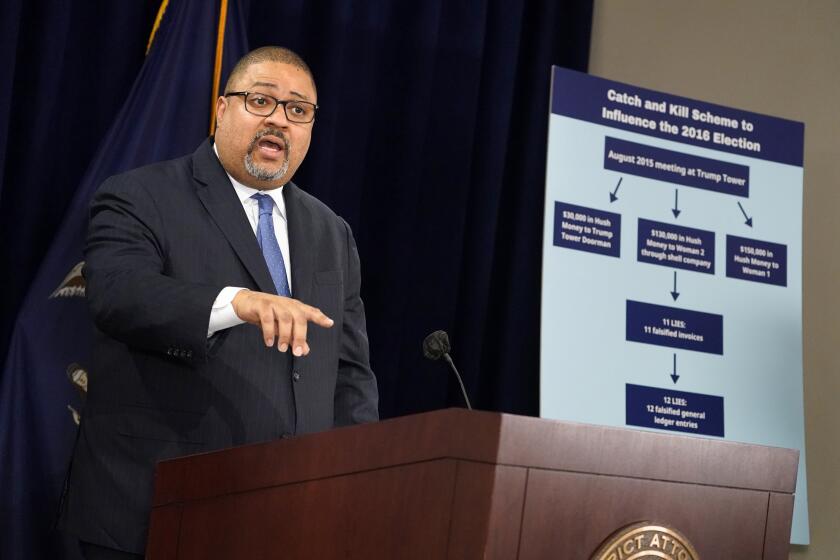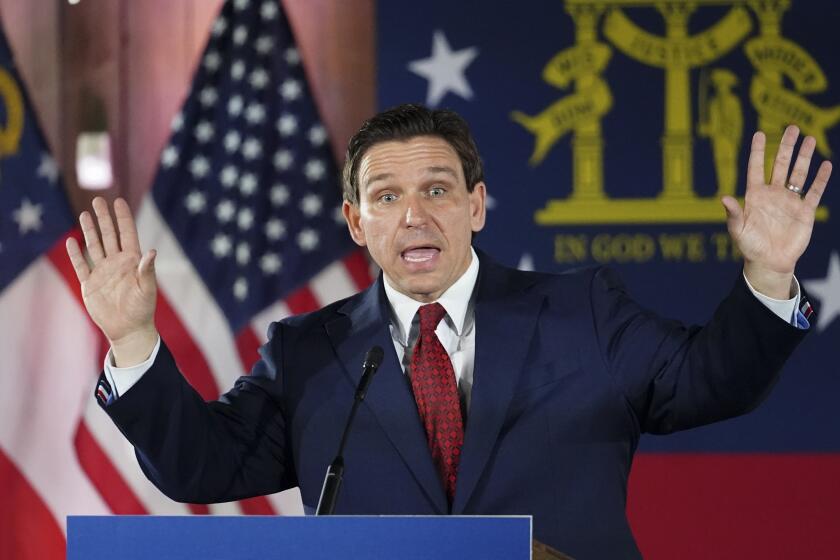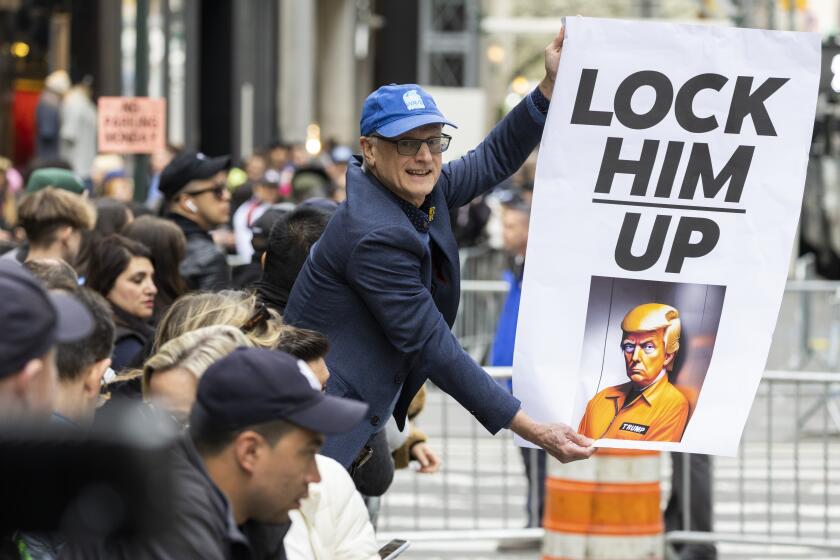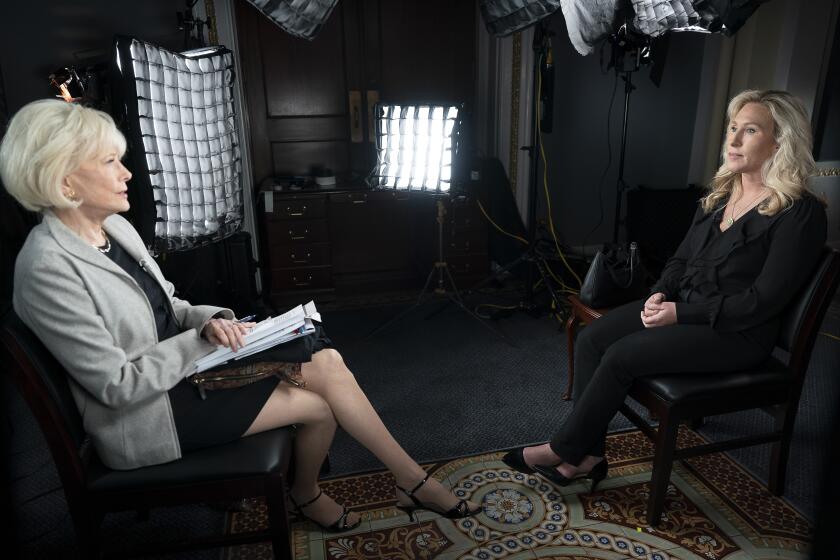Column: What the U.S. can learn from other nations about how to prosecute Trump
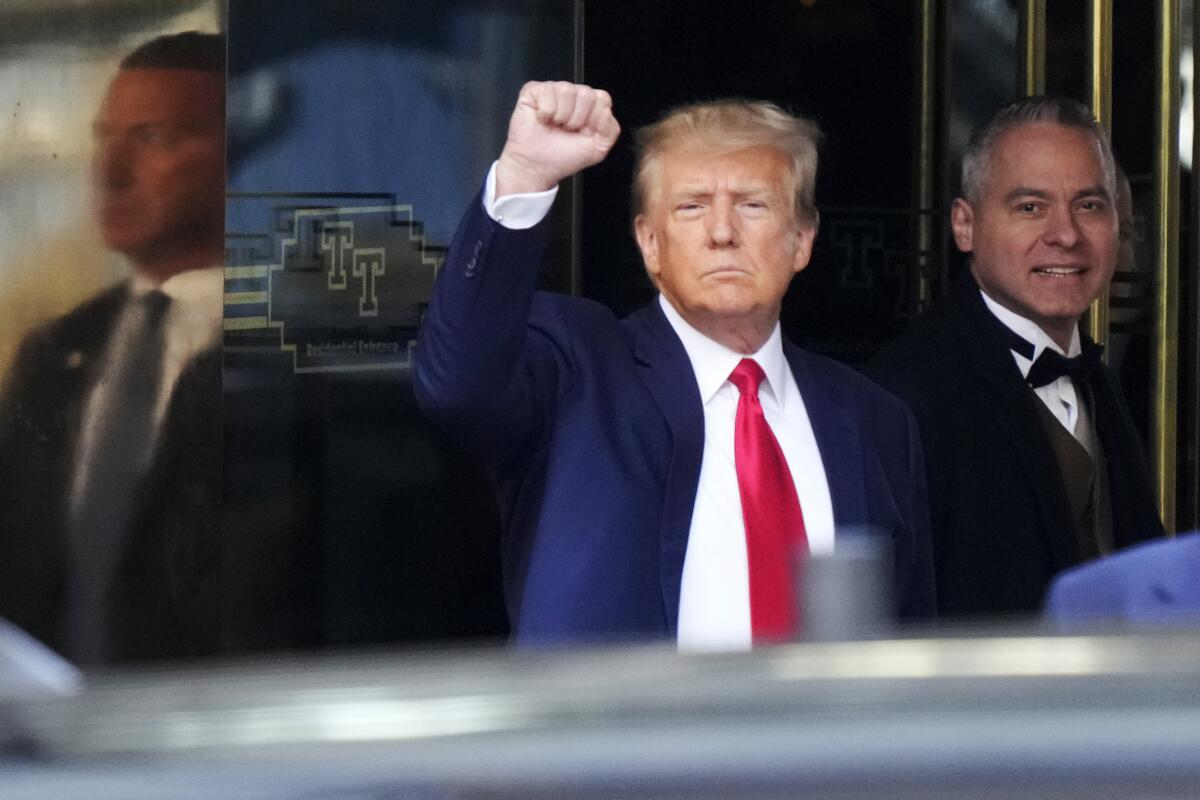
- Share via
No one is above the law. That should be an obvious, irrefutable principle in a democratic country.
And in many countries, it is. In recent days, as the historic criminal prosecution of former President Trump has moved forward in Manhattan, plenty of examples have been offered of nations that have put that principle to the test — trying, convicting and in some cases incarcerating their top leaders for corruption, theft, bribery and other crimes.
Surely a rules-based democracy like the United States can be as principled as those other countries and bring a successful criminal case against a former head of state who has broken the law. Yet before 10 days ago, no current or former U.S. president had ever been indicted or charged, much less convicted. Many Americans apparently believe that prosecuting a president is improper or beyond the pale. (When Richard Nixon came close to being charged, he was pardoned by his successor, Gerald Ford, to preserve national “tranquility.”)
Opinion Columnist
Nicholas Goldberg
Nicholas Goldberg served 11 years as editor of the editorial page and is a former editor of the Op-Ed page and Sunday Opinion section.
By contrast, consider France, where both Presidents Nicolas Sarkozy and Jacques Chirac were tried for corruption and convicted in recent years. It may be no great testament to French democracy that they needed to be prosecuted, but it is to their nation’s credit that they were.
In Italy, Silvio Berlusconi, who served three terms as prime minister, was convicted of tax fraud in 2012.
In South Africa, former President Jacob Zuma was charged in 2021 with taking bribes; he faces 15 years in prison.
In South Korea, three former presidents have been convicted of corruption.
In Israel, Benjamin Netanyahu is serving as prime minister and, at the same time, standing trial for bribery and fraud.
Good for those countries for holding — or at least attempting to hold — their top leaders accountable for criminal misbehavior. When done right, it can build faith in government and the law, and serve the cause of equality and justice.
How strong is Manhattan Dist. Atty. Alvin Bragg’s criminal case against former President Trump? The unsealed indictment provides new details.
But what’s been less often discussed in recent days, and which complicates the picture, is that there are also countries where the law is wielded like a weapon by powerful politicians against their enemies. This is the example that Trump and his Republican allies are implicitly pointing to when they insist that his prosecution has been corrupted by politics.
Consider Pakistan, where rival politicians, often from family dynasties, routinely seek to use the the country’s judicial system against one another. As the dynasties gain, lose and retake power, the courts are used to punish, weaken or sideline those who challenge them.
Again and again, Pakistani politicians have been hit with criminal charges after leaving office, including allegations of corruption, treason and money laundering. At the moment, former Prime Minister Imran Khan faces dozens of charges that he says were instigated by the government of his successor, Prime Minister Shahbaz Sharif.
Now, the United States is not Pakistan or anything like it. But Trump wants us to believe it is.
The Florida governor threatened to refuse to extradite former President Trump to New York, showing contempt for the Constitution and the rule of law.
It is not helpful to Manhattan Dist. Atty. Alvin Bragg that the crimes charged in the Trump indictment — 34 felony counts of falsifying business records — sound to the layperson like bookkeeping offenses and not terribly serious violations of the law. What’s more, they’re being prosecuted by a Democratic district attorney.
Thus they give oxygen to the argument that a politically motivated prosecutor was out fishing for charges, no matter how obscure, technical or tangential. That it was a witch hunt, as Trump likes to say. (He has pleaded not guilty to all 34 counts.)
But it turns out that’s not true; in fact, there’s nothing at all unusual about the case Bragg brought. His office charges people with falsifying records on a regular, “bread-and-butter” basis, he said. According to lawyers Karen Friedman Agnifilo and Norman Eisen, Trump is the 30th defendant to be indicted on false records charges since Bragg took over a year ago.
Politically speaking, it would undoubtedly have been better for the country if Trump had been indicted first for his bigger, broader, more obviously outrageous offense of seeking to subvert the 2020 election, rather than for falsifying hush money payments to a porn actress.
Think of the case in Manhattan as a mirror image of the Benghazi investigations that took aim at Hillary Clinton. This time the goal is justice, not shaming a political target.
It would have gotten more clearly to the heart of what’s worst and most dangerous about Trump. It might have been more persuasive to skeptics. But that case may yet be brought. The district attorney in Fulton County, Ga., is still investigating Trump’s demand that local officials “find” him 11,780 votes. And the Justice Department’s special counsel Jack Smith continues to probe Trump’s post-election lies and machinations, including his role in the Jan. 6 Capitol attack.
Of course it’s ironic that Trump insists he’s being persecuted by politically motivated enemies. The fact is, there is no one more willing to politicize the legal system (and the country’s democratic institutions generally) than Trump himself. I firmly believe he would turn us into Pakistan overnight if it would gain him a hundred votes or a hundred dollars.
As president, he repeatedly called into question the legitimacy of judges who challenged him and court rulings he disagreed with.
What could possibly justify a prime-time, 14-minute ’60 Minutes’ tribute to extremist, anti-democratic Republican Marjorie Taylor Greene?
He demanded the arrest of political adversaries, including President Obama and then-Vice President Joe Biden. He was especially vocal in 2016 about his opponent, Hillary Clinton, who he said “has to go to jail” for accessing her official email on a private server, which he insisted at campaign rallies was the “biggest political scandal since Watergate.”
All Americans should agree that it is wrong to use the justice system to punish one’s enemies. But at the same time, it is absolutely essential that we hold powerful people to account for true crimes.
The ongoing investigations against Trump must, of course, be conducted fairly and without prejudice. He should be presumed innocent and treated no better or worse than any other defendant.
But he doesn’t deserve special protection, either, just because he was once the president and hopes to be again.
More to Read
A cure for the common opinion
Get thought-provoking perspectives with our weekly newsletter.
You may occasionally receive promotional content from the Los Angeles Times.

